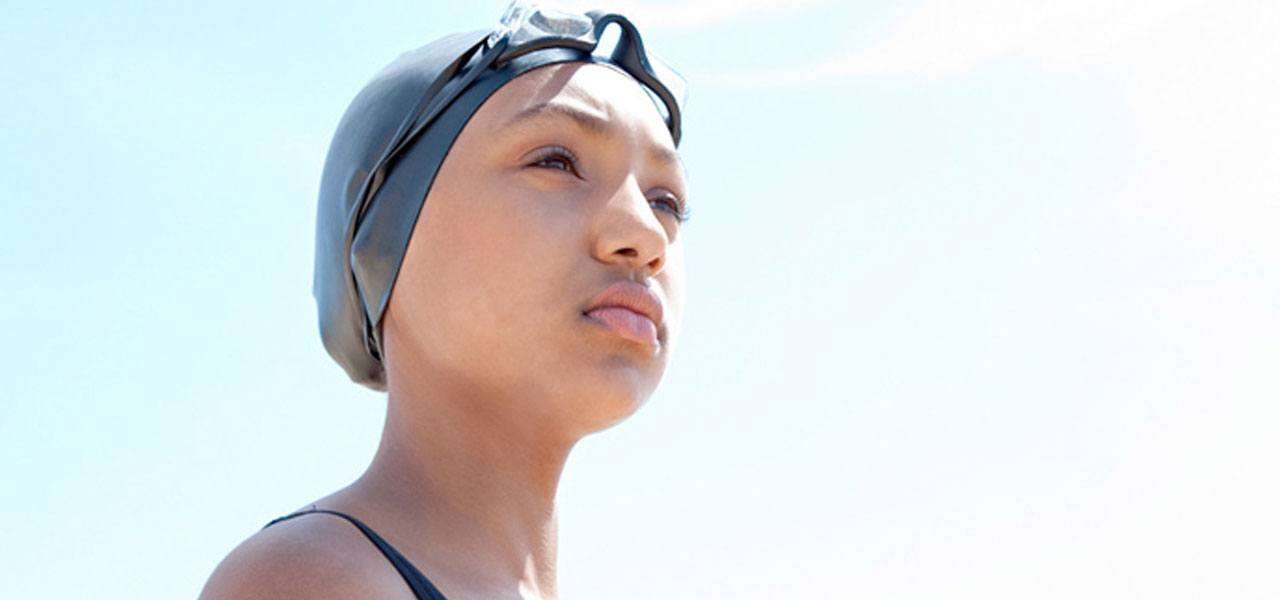
Swim Dad’s Advice on How to Support Black Girl Swimmers
Joe Artis is the father of 3 young ladies aged 21, 18 and 13. Joe learned to swim as a child and passed his love of the sport to his children. His two oldest swam through high school and the youngest is still swimming. We knew Joe would have a ton of great advice for swim parents. He shared with Black Kids Swim his thoughts on what it takes to be a supportive swim parent.
Be careful not to pressure your child.
Being around the sport for so many years I’ve learned a few things. One sport one family one stop! When my oldest girls were around 9 or 10 years old, I used to want for them to earn swimming scholarships to college. And I see a lot of parents who want that success for their children. I try to remind them that the greatest thing about swimming is that its a lifetime sport. I tell parents all the time don’t always think that your child is going to go to the Olympics. You don’t need a champion at 9 or 10 years old – you want a champion at 17 because that’s when it counts. And looking at a child’s times you can get realistic. You can have that conversation and say, ‘look, this is your time, and these are the times colleges are looking for.’ And you can ask them ‘do you want to work to get down to these times or do you not want to work for this?’ and then it really becomes a child’s decision at that point.
The child has to want it more than the parents.
Up to 9th grade most kids swim for their parents, and they may even swim for a high school team because those teams are usually not as competitive as club teams. But really, after 9th grade a child will decide if they want to swim for themselves. Ask your kids “What’s your goal? because its not my goal – i’m not the one doing it.” When kids reach high school they can do other sports and that’s the time when they have to decide for themselves if they are going to dedicate themselves to one sport in particular. Up to age 13 they can swim three or four days a week and still be competitive. But once they
get to high school the child has to be dedicated and self motivated. They will have to swim 4 to 5 days a week minimum. If they decide in high school that they want to swim in college then they are going to have to do it for themselves. Because no one is going to wake them up at 5 or 6 in the morning every day.
It’s tough for African American girls
I have three girls, so I get it. Black girl swimmers worry about their hair. When our daughters reach the pre-teen phase they all of a sudden discover boys and they get very concerned with their hair being done all of the time. So that is a transition time when you find out if they are going to swim in college or continue to swim period.
Parents have to be committed in order for their child to have a chance
Parents give up almost as much time as the kids. Parents say “well, i want my child to be as fast as that kid or that kid” – but if your child is only coming twice a week that is not going to happen.’ The swimmers who come 5 days a week see the results in the water.
Choose your swim team or club carefully
When choosing a swim team parents should look at the coaches, the cost (because it is not a cheap sport), and the time. The time and location of practice has to work. The kid has to be available to make practices regularly because if the kid misses practice they are not going to do well. If a kid wants to excel in swimming they have to pay the water bill. You have to be in the water.
Colleges expect scholarship athletes to work
If your child is lucky enough to get a college scholarship they have to understand that they will be working for the university. These schools are not giving away money because kids look good. Coaches give money for performance and swimmers have to stay on top of their game. It all depends on what Division 1 or Division 2 school you go to because Texas, Tennessee, Stanford, Florida – they expect you to swim first and study second. They expect every waking moment that you are not studying to be spent in the water. It’s an extremely high level of commitment – but if your child just loves it then it is not work for them, it is just what they do. And that is the mindset that the Theresa Banks Swim Club is trying to establish in these swimmers.
Parents have to be aware of the ‘Burnout’ factor
Swimming is a sport where children can burn out very quickly. Name another sport that you participate in 5 to 6 days a week for 10 or 11 months out of the year. You do that starting at the age of 7 or 8 and you can see how easy it is for kids to burn out. So parents have to be careful and mindful of the burnout factor. What I suggest for young swimmers is no more than 3 – 4 days of practice a week. If they want to do more then let them. To keep my kids from burning out after the championship meets in March I give them a one week break. The swim club still offers practice but I think that it’s important for kids to have a break – to do whatever they want after school for a change. And I tell them that for those 2 hours that they would normally be in swim practice they can do whatever they want. Go to the movies, out to dinner, whatever. We make it a real fun time that they look forward to.
70%of black kids can’t swim. It’s true.
Half of my children’s friends can’t swim. They play in the water but they can’t swim. So I think with programs like USA Swimming’s ‘Make a Splash’ and Red Cross’ Learn to Swim programs those statistics are improving and it’s not as bad as it used to be. When my oldest daughter started swimming I could always spot her – she was the only black kid. But now it’s not so easy, because the sport is ‘colorizing’, it’s more diverse.
Changing the landscape of the sport is just about access. It’s only access.
When our community, when African Americans think of sports we don’t think of swimming. We think football, basketball, track, maybe soccer. Those are the sports we lean towards. and that’s because of the parents experiences. My kids learned to swim because swimming was a big part of my life. How is a kid going to get excited about swimming if their parents were not exposed to it?
Swimming is a lifetime sport. It’s not just about your child making it to the Olympic trials.
Swimming teaches kids more than just how to move fast in the water. It teaches them time management. One of the greatest compliments my children gave to the sport was that swimming taught them time management. Most kids, when they get home from school they can watch TV or play outside. Kids who have swim practice can’t do that. They realize that when they have free time in school or on the weekends they need to use that time to get their homework done or get some studying done. And as your children get older swimming gives them something positive to do when their parents are at work. Kids get home from school and no parents are home and maybe they let in another little girl or boy and get in to trouble. So, whether it’s swimming or something else the kids have to be kept engaged.
If they have the passion give them the tools.
If they are passionate about the sport, give them what they need to get on the right path. Use the motivational times (an age and gender based chart of national averages of swim times in various events) for progressing towards excellence. That way it’s not just about whether they came in first or second – but they can track their personal improvement.
Ebony is a wife and mommy of two gorgeous swimmers. She started Black Kids Swim to help parents (like herself!) who want to be supportive swim parents to African American children.







